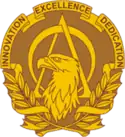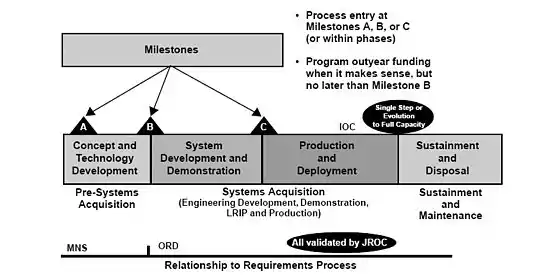United States Army Acquisition Corps
The United States Army Acquisition Corps (AAC) is the officer corps of the United States Army Acquisition Workforce (AAW).[1][2] The Acquisition Corps is composed of army officers who serve in acquisition, a specialized form of product development, fielding, and support.[3] These officers begin their careers in the other branches of the army for eight years, after which they may elect the Acquisition branch as their career as assistant program managers (APMs), program managers (PMs), and program executive officers (PEOs). (A PEO can be civilian.) Four percent of the 40,000 members of the army acquisition workforce are army officers;[4] the remainder are largely civilians, with some contingency contracting NCOs for urgent or emergency contracts.[1]
| Acquisition Corps | |
|---|---|
 | |
| Active | 1989–present |
| Country | |
| Branch | |
| Type | Military acquisition |
| Role | Product development, fielding, and support |
| Motto(s) | Pactum Excello |
| Colors | Black |
| Commanders | |
| Principal Military Deputy OASA (ALT) | LTG Robert L. Marion |
| Insignia | |
| Branch insignia |  |
| Branch plaque |  |
The director of the Army Acquisition Corps, currently a lieutenant general, also serves as principal military deputy (PMILDEP) to the Assistant Secretary of the Army for Acquisition, Logistics, and Technology or ASA(ALT). The PMILDEP is also director of combat systems for Army Futures Command (AFC), by Army Directive 2018-15.[5][6] The Office of ASA(ALT) has a direct reporting unit (DRU) which is denoted the U.S. Army Acquisition Support Center (USAASC). An office within USAASC, DACM ensures the professional development of the Acquisition Workforce as well as the officer corps itself, including the recruitment of suitable captains and majors into the pipeline of courses at Defense Acquisition University (DAU). DAU certifies the 150,000-member Defense Acquisition Workforce, including the Army's Acquisition workforce of 40,000 civilians, officers, and NCOs (MOS 51C).[1]
| Army Acquisition Workforce[1] | 40,000 | Army role | |
|---|---|---|---|
| % | count | ||
| USAASC | 12 | 4800 | acquisition support |
| Army Corps of Engineers | 18 | 7200 | combat service support |
| Army Materiel Command | 60 | 24000 | materiel provider |
| ATEC | 4 | 1600 | test and evaluation |
| Other | 3 | 1200 | low density acquisition |
| MEDCOM | 2 | 800 | combat medical equipment |
| SMDC | 1 | 400 | space and missile defense |
History
The Acquisition Corps was instituted in 1989 by Chief of Staff Carl Vuono.[7] Vuono's goal was to professionalize the Acquisition workforce.
During the post-9/11 period, the US Army was preoccupied with counter-insurgencies, leaving its competitors free to develop new weapon systems. In order to address this need for modernization, the Army Futures Command (AFC) was instituted in 2018.[8] AFC's approach to modernization is to clarify the engineering of a candidate system before it becomes a Program of Record in the Acquisition process. "Our new approach is really to prototype as much as we can to help us identify requirements, so our reach doesn’t exceed our grasp. ... A good example is Future Vertical Lift: The prototyping has been exceptional." —Secretary of the Army Mark Esper[9]
Acquisition process

For a Program of Record,[10] the Acquisition Life Cycle is
- °Materiel Solution Analysis;[11]
- °Technology Maturation & Risk Reduction;[12]
- °Engineering & Manufacturing Development;[13]
- °Production & Deployment;[14]
- °Operations & Support[15]
The 40,000 member Acquisition workforce (AAW) is composed as follows (Source: CAPPMIS As of 31 July 2018[1]):
- Percentage, Acquisition Career Field
- 1% Business-Cost Estimating
- 4% Information Technology
- 4% Business-Financial Management
- 17% Life-cycle Logistics
- 20% Contracting
- 4% Production, Quality and Manufacturing
- 23% Engineering
- 8% Program Management
- 12% Facilities Engineering
- 1% Purchasing
- <1% Industrial/Contract Property Management
- 1% Science & Technology Manager
- 5% Test and Evaluation
The Acquisition process has existed for centuries,[16] but has historically been beset by dysfunctional response to change.[17]:Minute 19:40[18] The US Army has not fielded a new weapon system in decades.[19][20][21] The Acquisition process is in need of reform, as noted by Senator John McCain to General Mark Milley, during Milley's confirmation hearings as Army Chief of Staff.[22]:minute 7:30 A series of Acquisition reforms[16] has attempted to address these problems, not the least of which is an impending funding shortfall in 2020. Secretary Esper scrubbed through 800[23] modernization programs to reprioritize funding[24] for the top 6 modernization priorities,[25] which will consume 80% of the modernization funding of the army,[26] of 18 systems.[26] The Budget Control Act will restrict funds by 2020.[27][28][29][30][31][32][33][34][35] One issue is that Acquisition leadership gets unreadable reports, according to the GAO.[36]
A succession of Army Secretaries and Army Chiefs of Staff have instituted reforms, or else project cancellations, in response.[7]
The 2018 approach is to prototype and experiment (before Milestone B, for Army Acquisition)[10]:Army Regulation (AR 70–1) before the Materiel Development Decision.
Modernization priorities
The Army's modernization priorities of 2018, and its Cross-functional teams (CFTs), are found in the Army Futures Command (AFC):
- Long Range Precision Fires (Artillery branch)
- Next Generation Combat Vehicles (Armor branch)
- Future Vertical Lift (Aviation branch)
- Expeditionary network (Signal Corps)
- Air and Missile defense (Air Defense Artillery branch)
- Soldier Lethality completes the top six CFTs; in addition,
- Assured Positioning, Navigation and Timing seeks a wartime replacement for GPS, and
- Synthetic Training Environment provides virtual reality training for Soldiers at their home stations
The last two CFTs are cross-cutting over multiple domains.
From the viewpoint of Futures Command, a quick failure is preferable to a long, drawn-out failure. The ASA(ALT) Bruce Jette has cautioned the acquisition community to 'call-out' unrealistic processes which commit a program to a drawn-out failure,[36] rather than failing early, and seeking another solution.[37] A cancellation with harvestable content is not a total loss. In the Department of Defense, the materiel supply process was underwritten by the acquisition, logistics, and technology directorate of the Office of the Secretary of Defense (OSD), with a deputy secretary of defense (DSD) to oversee five areas, one of them being acquisition, logistics, and technology (ALT).[38] ALT is overseen by an under secretary of defense (USD).[39] But as of 2018 the DoD under secretary (USD) for ALT is participating in a reorganization of the DoD Acquisition process.[40] (See: Joint Capabilities Integration and Development System (JCIDS), and Analysis of Alternatives) Dr. Jette points out that the army, by using middle-tier acquisition, has been exempted from the DoD 5000 and JCIDS procedures and is allowed to use rapid prototyping.[41]:minute 17:10
Modernization process
The modernization of the combat systems of the US Army in a timely way is the goal of Futures Command, established in 2018. AFC uses Cross-functional teams (CFTs) to downselect prospective requirements from the myriad solutions that might possibly feed into the Acquisition process. Each CFT addresses one of a manageable number of priorities set by the secretary and Chief of Staff of the Army. A CFT is a team of teams, at base a small co-located team of experts, each expert reaching back to their respective team when necessary, for additional knowledge on requirements, acquisition, science and technology, test, resourcing, costing, and sustainment. Each CFT experiments on, and tests, prototypes to learn what is doable in a timely way. Each prototype is expected to reach Milestones: A, B, C, .. until a Materiel Development Decision (MDD) can be made, whether or not to admit a Combat system into the Acquisition process. Otherwise a prototype is discarded or divested from the modernization portfolio.
The current acquisition system has pieces all throughout the Army. ... There’s chunks of it in TRADOC and chunks of it in AMC and then other pieces. So really all we’re trying to do is get them all lined up under a single command…..from concept, S&T, RDT&E, through the requirements process, through the beginnings of the acquisition system — Milestone A, B, and C — ….aligned under that same commander. ... We will finally achieve… unity of command — Secretary Esper.[42]
The ASA(ALT) is the Acquisition executive (AAE). By statute, an MDD is ultimately the decision of the Acquisition executive (because the AAE, with the concurrence of the Chief of Staff of the Army, has Milestone Decision Authority —MDA),[5][43] who jointly might delegate the details of that materiel development decision to the PMILDEP or PEO. The PMILDEP has found CFTs to be so useful that he has recommended that each PEO find a CFT as soon as possible (in 2018).[44]
The principal military deputy (PMILDEP) of ASA(ALT) is also director of combat systems for Army Futures Command (AFC), by Army Directive 2018-15.[5]
References
- 96% of the Army Acquisition Workforce are civilian
- Dr. Bruce D. Jette, ASA(ALT) (April 30, 2019) From the AAE: Building the Army Acquisition Team New Army Talent Management system: proposals for getting PhD-level officers into AAW
- ASA(ALT) Weapon Systems Handbook 2018 Page 32 lists how this handbook is organized. 440 pages.
- By Modernization priority
- By Acquisition or Business System category (ACAT or BSC). The Weapon systems in each ACAT are sorted alphabetically by Weapon system name. Each weapon system might also be in several variants (Lettered); a weapon system's variants might be severally and simultaneously in the following phases of its Life Cycle, namely — °Materiel Solution Analysis; °Technology Maturation & Risk Reduction; °Engineering & Manufacturing Development; °Production & Deployment; °Operations & Support
- ACAT I, II, III, IV are defined on page 404
- U.S. Army Acquisition Support Center (Tuesday, February 5, 2019) Army Acquisition Workforce
- Army Directive 2018-15 U.S. Army Futures Command Relationship With the Office of the Assistant Secretary of the Army (Acquisition, Logistics and Technology) and DCS G-8, 27 August 2018
- Army Directive 2018-15, section 6b: "PMILDEP will additionally be AFC director, Combat Systems"
- Wall chart
- Dan Lamothe Washington Post (2018-07-12) Army to unveil details about new Futures Command in biggest reorganization in 45 years
- Sydney J. Freedberg Jr. (24 January 2019) Bell V-280 Flies 322 MPH: Army Secretary Praises Program
- Acquipedia Program of Record
- Acquipedia, Materiel Solution Analysis Phase
- Acquipedia, Systems Engineering in Technology Maturation and Risk Reduction
- Acquipedia, Engineering & Manufacturing Development
- Acquipedia, Production & Deployment
- Acquipedia, Operations & Support
- ARMY ACQUISITION: A BRIEF HISTORY
- AFC announcement, Friday (13 July 2018) Army Officials Announce New Army Command video 34 minutes, 27 seconds
- Army News Service (21 February 2018) Army needs entrepreneurs, says under secretary
- Thomas E. Ricks (MARCH 2, 2015)Why hasn’t the Army’s regular acquisition process produced anything in decades? --Future of War conference.
- Arpi Dilanian and Matthew Howard Army.mil (6 September 2018) Safer, smarter, faster: An interview with Gen. James McConville
- "US edge has eroded to a dangerous degree"
- DVIDs video, 24 August 2018 press conference
- Hannah Wiley (April 6, 2018) Program cuts likely under Army secretary's new Futures Command
- Jen Judson (17 July 2018) US Army asks Congress to shift millions in FY18 dollars. What’s behind the request?
- Sydney Freedberg (29 August 2018) Army Futures Command: $100M, 500 Staff, & Access To Top Leaders
- David Vergun (September 5, 2018) Richardson confirmed as Futures Command deputy commander
- Devon L. Suits, Army News Service (March 28, 2018)CHIPS Articles: Army Secretary defines goals for coming decade — modernization, Futures Command
- Jeff Martin (15 October 2018) How did the Army find $25 billion for new equipment? video
- Daniel Goure (October 18, 2018) Can Trump Rebuild The Military As Deficits Balloon?
- Sydney J. Freedberg Jr. (October 26, 2018) Joint Experiments Will Pick Budget Winners & Losers: Dunford Task is to cut $33 Billion from 2020 budget
- Youtube: What will $716 Billion Buy You? US Defense Budget 2019 Weapons
- Michael J. Meese (23 Dec 2016) Chapter 4 : The American Defense Budget 2017–2020 Note Fed chart 1970-2026
- PAUL MCLEARY (October 26, 2018) Trump Orders DoD To Take Surprise $33B Budget Cut 2020 DoD budget cut from $733 billion to $700 billion
- PAUL MCLEARY (November 14, 2018) The Pentagon’s First-Ever Audit: A Big Disappointment?
- Wesley Morgan (09 December 2018) Trump reverses course, tells Pentagon to boost budget request to $750 billion
- GAO report (Jun 2017) ARMY CONTRACTING Leadership Lacks Information Needed to Evaluate and Improve Operations
- Bruce Jette, Building the Army of the future
- DoDI 5000.02: Defense Acquisition Life Cycle Compliance Baseline (Pre‐Tailoring)
- DoD org chart
- Terri Moon Cronk (March 29, 2018) DoD Restructures its Acquisition, Technology, Logistics Organization
- DVIDS video (10.08.2018) AUSA 2018 CMF #1: Army Futures Command Unifies Force Modernization
- Sydney Freedberg, Jr. (26 March 2018) Army Outlines Futures Command; Org Chart In Flux
- Financial Management School, IDENTIFY THE RESEARCH, DEVELOPMENT AND ACQUISITION (RDA) SYSTEM, SUMMARY SHEET
- Ms. Audra Calloway (Picatinny) (September 19, 2018) With new Army Futures Command, senior acquisition leader discusses role of Program Executive Offices